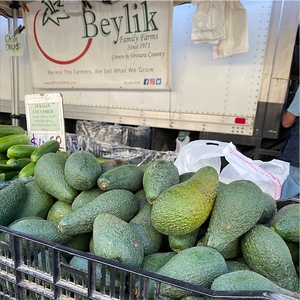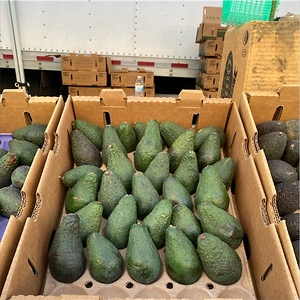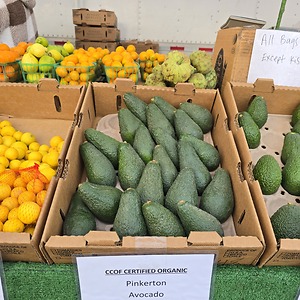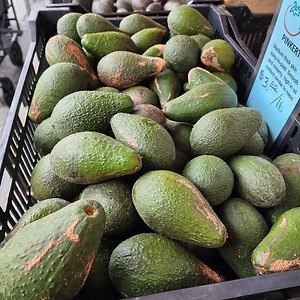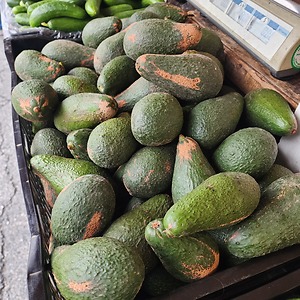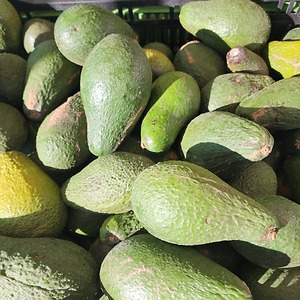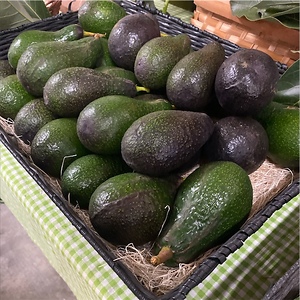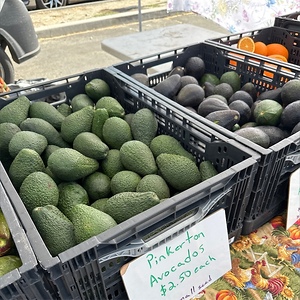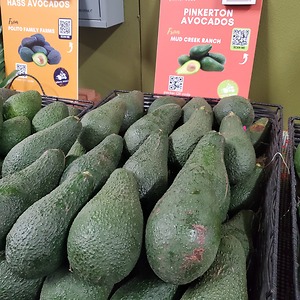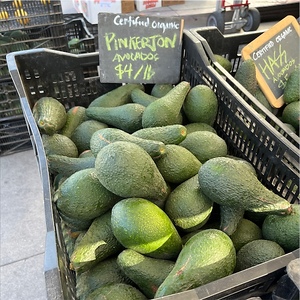


Pinkerton Avocados
Estimated Inventory, lb : 0
Description/Taste
Pinkerton avocados are a variety known for their elongated necks, giving them a distinct pear shape. They are a medium to large sized avocado, weighing anywhere from 7.5 to 14 ounces. They have green, slightly pebbled skin that’s leathery in texture and easy to peel. Their flesh is smooth and creamy, with a high oil content and fine texture that’s not at all fibrous. The flesh has a yellow-green hue and a high flesh-to-seed ratio, encasing a small light brown seed. Pinkerton avocados have a mildly earthy aroma with hints of nuttiness. Their flavor is creamy and nutty, staying true to the classic avocado taste, though not as rich as other varieties like Hass.
Seasons/Availability
Pinkerton avocados are available from spring to mid-summer.
Current Facts
Like all avocados, Pinkerton avocados are botanically classified as Persea Americana and belong to the Lauraceae family, which also includes cinnamon, sassafras, and bay leaves. Though 95% of avocados consumed in the United States are of the Hass variety, Pinkerton has gained attention due to its high fruit-to-seed ratio, conveniently small tree size, and early seasonal availability. Pinkerton avocados are believed to be a hybrid of Rincon and Hass avocados. Avocado varieties are classified as being either Type A or Type B, depending on the flowers’ opening time. Pinkerton avocados are identified as a Type A variety of Guatemalan descent, though they were first cultivated in California. Pinkerton avocados can produce larger harvests when grown near other avocado varieties like the Edranol, Fuerte, Bacon, Sir-Prize, and Ettinger.
Nutritional Value
While the nutritional value of Pinkerton avocados isn't widely known, avocados, in general, are known for their diverse dietary profile. Avocados contain vitamins E and K, nutrients that are helpful in protecting against cellular damage, supportive of immune function, and essential for blood clotting and bone health. The meaty taste of their flesh indicates their high protein levels, a nutrient that helps supply the body with energy and encourages cell repair and growth. Avocados contain potassium and magnesium, helping encourage proper heart function, muscle contraction, and bone health. They provide a variety of B vitamins, including B1, B2, B3, and B7. These nutrients can help convert food to energy and promote healthy skin, digestion, hair, and nails. Avocados act as a nutrient booster, enabling the body to absorb more fat-soluble nutrients in the foods eaten alongside them. They have a reputation for being high in fat and are second only to olives among fruits in oil content. Their oil is high in monounsaturated fatty acids, which are relatively healthy and help in preventing breast and prostate cancer as well as lowering bad LDL cholesterol and increasing healthy HDL cholesterol.
Applications
Pinkerton avocados are mostly consumed raw. They can be eaten on their own, in a dip, on toast or sandwiches, added to omelets, or sliced into salads with acidic dressings. When used in hot dishes, Pinkerton avocados should only be cooked for a brief period of time or added after the dish has already been fully cooked. They can be used as a topping for pasta dishes like chicken penne, mashed together with sour cream and lemon juice to be served on crackers, or combined with pesto in a spread or sauce. One of the most famous ways to use avocados like the Pinkerton variety is in guacamole. This popular Mexican appetizer can be made by pureeing the avocadoes and combining them with onions, spices, and lime juice. Pinkerton avocados pair well with lemons, limes, tomatoes, pineapple, roasted pecans, cheeses like feta, goat, brie, gouda, and cheddar, and grilled proteins like steak, prosciutto, chicken, pork, and shrimp. To make sure a Pinkerton avocado is ripe, both the neck and the base of the fruit should feel soft. If there are grey-black spots on some areas of the avocado's skin, it's overripe. Ripe avocadoes can be stored at room temperature for 2-3 days. To store a cut avocado in the refrigerator, preserve its color by spraying or brushing the exposed surfaces with lemon juice and cover with plastic wrap to seal out air exposure.
Ethnic/Cultural Info
The origins of the Pinkerton avocado began in the late 1940s when a man named Wesley Pinkerton planted Rincon avocado seedlings in pots to use as grafting for his avocado trees. One of the discarded seedlings from this experiment started growing vigorously and began bearing avocados by 1959. Pinkerton’s ranch foreman Clarence Holloway noticed that the resulting avocado had a high fruit-to-seed ratio and appealing taste. Pinkerton and Holloway then grafted the wood from this seedling to three other avocado trees and watched them grow for about a decade until a commercially viable avocado was developed. The Pinkerton avocado was patented in 1975 and by 1982, over 100,000 Pinkerton avocado trees had been planted in California. Though Pinkerton avocados now only make up less than 1% of California’s total avocado acreage, they account for about a fourth of the trees grown by Brokaw Nursery, the biggest nursery in the state.
Geography/History
Pinkerton avocados originated from the Pinkerton Ranch in Saticoy, California, and were patented in 1975. They grow best in mild to warm climates that don’t drop below freezing or experience extreme heat. As a hybrid variety, Pinkerton avocados are not found in the wild. They are instead cultivated in home gardens and by specialty commercial growers. After they were initially introduced in the mid-20th century, Pinkerton avocados gained popularity for their long-distance shipping potential, their ability to fill the void left by declining Fuerte avocado acreage, and because their timing helped prevent people from picking Hass avocados too early, since Pinkertons ripen earlier in the season. They didn't experience as much commercial success as other varieties due to their shorter harvest season and slow ripening process, which discouraged retailers seeking avocados with faster turnover. Still, Pinkerton avocados continue to be produced in areas of California, as well as places with similar climates like South Africa. Pinkerton avocados are most likely to be found at specialty stores, farmers markets, and in home gardens.
Recipe Ideas
Recipes that include Pinkerton Avocados. One
Podcast



